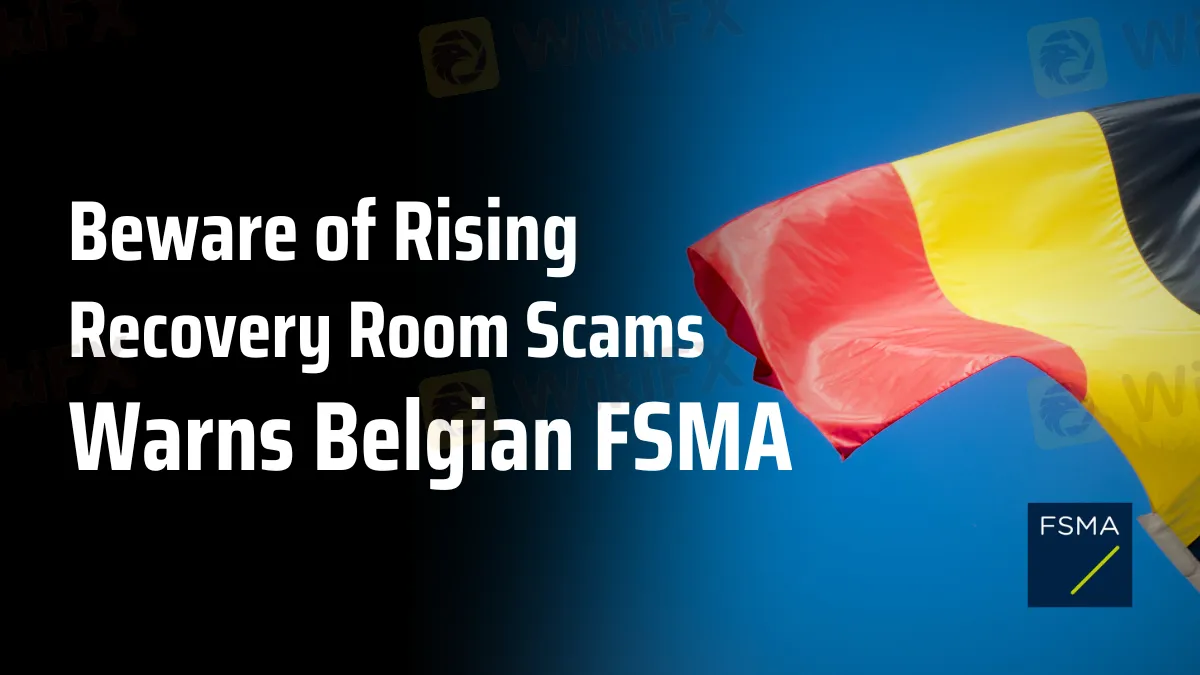简体中文
繁體中文
English
Pусский
日本語
ภาษาไทย
Tiếng Việt
Bahasa Indonesia
Español
हिन्दी
Filippiiniläinen
Français
Deutsch
Português
Türkçe
한국어
العربية
Beware of Rising Recovery Room Scams, Warns Belgian FSMA
Abstract:Belgium's FSMA alerts the public to recovery room fraud, where scammers posing as professionals offer fake aid to recover losses from investment fraud.

What is “Recovery Room Scam?”
Recovery room scams are focussing their attention more and more on individuals. Here is when con artists contact investors who have lost money on investments or have been conned and promise to assist them recover it for a one-time payment.
Either a bogus explanation or none at all is provided on how money will be reclaimed. This may be done by pretending to be us or by claiming to collaborate with the police, government, or other regulator to get back any money that has been misplace. Generally speaking, before providing any services to recoup any consumer's losses, recovery rooms demand a fee or transaction charge.
Meanwhile, these con artists usually make phone or email contact with potential victims. The FSMA has noted, meanwhile, that sometimes people come upon these phony “recovery rooms” when using social media or the web. To seem official, these con artists often pose as respectable companies such as accounting firms, legal offices, police agencies, or financial regulators. They even go as far as to increase their credibility by utilizing the names of actual businesses or governmental organizations.

Either a bogus explanation or none at all is provided on how money will be reclaimed. This may be done by pretending to be us or by claiming to collaborate with the police, government, or other regulator to get back any money that has been misplace. Generally speaking, before providing any services to recoup any consumer's losses, recovery rooms demand a fee or transaction charge.
These recovery room scams operate by charging victims money upfront while claiming to be paying for taxes, legal fees, and administrative charges. These unfounded accusations are a defining feature of the con. Sometimes the con artists want only remote access to the victim's computer in exchange for what seem to be free services. This enables them to download malware or get hold of private financial data.
To further increase the financial risks, victims are sometimes requested to create and activate wallets on cryptocurrency sites. Sadly, victims have little to no opportunity to get their money back once the con artists have taken money or stolen personal information.
The public is advised to be cautious and avoid interacting with FSMA-identified firms that are operating unlawfully. Among them are Apag-Audit AG, Claim Justice, Crypto Conduct Authority, and numerous more operating under the cloned firm names Etoro (Torocoin) and FXVC. Globalgetback.com, ifp.center, and trading-center.co were among the websites specifically identified as deceptive.
This alert draws attention to a concerning pattern where fraudsters—either the same or different—often prey on victims of first investment scams. Sometimes the initial fraudsters sell the victims' contact details to other con artists who try the recovery room scam.
The FSMA warns against responding to any unsolicited proposals that guarantee the return of lost investment money. People who have before been victims of investment fraud are especially advised to exercise caution since they will probably be the target of it again. The agency's ongoing efforts to uncover and stop fraudulent activity are aimed at protecting its customers from further financial harm.

Disclaimer:
The views in this article only represent the author's personal views, and do not constitute investment advice on this platform. This platform does not guarantee the accuracy, completeness and timeliness of the information in the article, and will not be liable for any loss caused by the use of or reliance on the information in the article.
Read more

Webull Launches SMSF Investment Platform with Zero Fees
Webull introduces commission-free SMSF trading, offering over 3,500 US and Australian ETFs, with no brokerage fees and enhanced portfolio tools.

April Fool's Day Scam Prevention Experience Collection
Share your “Forex Fraud Prevention Experience”, win WikiFX points and gold rewards!

Australian Authorities Joins Forces with Philippine Authorities to Combat Cyber Scams
AFP tackles cyber scam boiler rooms in the Philippines, training police to fight fraud and protect Australians from romance and cryptocurrency scams.

How Will the Market React at a Crucial Turning Point?
Safe-haven assets like gold and U.S. Treasuries are surging, while equities face mounting pressure. As this pivotal moment approaches, how will the market react?
WikiFX Broker
Latest News
How Crypto Trading Transforms FX and CFD Brokerage Industry
FCA Warns Against 10 Unlicensed or Clone Firms
CySEC Warns Against 14 Unlicensed Investment Websites
Top Currency Pairs to Watch for Profit This Week - March 31, 2025
Will natural disasters have an impact on the forex market?
Philippines Deports 29 Indonesians Linked to Online Scam Syndicate in Manila
Exposing the Top 5 Scam Brokers of March 2025: A Closer Look by WikiFX
Gold Prices Climb Again – Have Investors Seized the Opportunity?
Webull Launches SMSF Investment Platform with Zero Fees
Australian Regulator Warns of Money Laundering and Fraud Risks in Crypto ATMs
Currency Calculator







